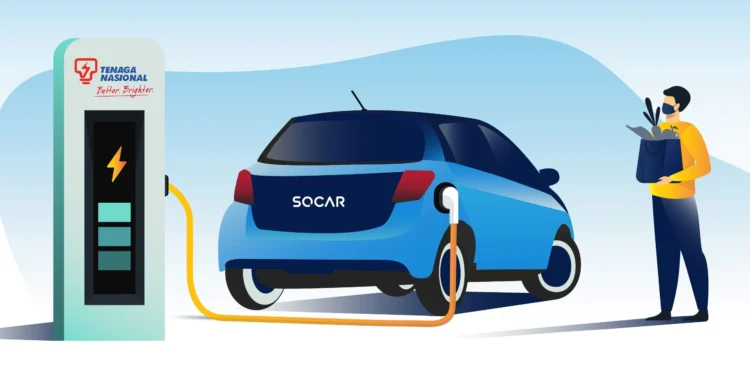Planning an urban journey across Azerbaijan in an electric or hybrid vehicle requires up-to-the-minute knowledge of where and how to battery charge in Azerbaijani cities. From the bustling streets of Baku to emerging regional hubs, the charging infrastructure is evolving rapidly. This article provides a professional, in-depth exploration of current public charging points, usage protocols, payment systems, and future developments—ensuring EV drivers and travelers alike can navigate Azerbaijan’s roads confidently.
Battery Charge Infrastructure in Baku
Baku, as Azerbaijan’s capital, is the epicenter of the country’s electric vehicle (EV) charging network. Although public stations remain relatively scarce fewer than 90 across the entire nation over 70 percent are concentrated within Baku’s metropolitan area.
-
Major Network Operators
-
SOCAR has introduced fast-charging points at key petrol stations, including one on Salyan Road in Baku offering a 50 kW DC charger compatible with CCS and CHAdeMO connectors
-
ENRG is a home-grown platform deploying both AC (22 kW Type 2) and DC (50–150 kW CCS) chargers, accessible via its mobile app, which provides real-time availability and payment integration
-
Green Car LTD partnered with Azerishig OJSC to install stations e.g., atop Park Bulvar Mall featuring 22 kW Type 2 units for public use
-
-
Key Locations
-
Hilton Baku (66 Zərifə Əliyeva Street): six 22 kW AC chargers maintained by Electrify.az
-
Heydər Əliyev Avenue: a Green Car point with a single Type 2 charger
-
CW3W+PR3 (Baku Car Parking): one publicly accessible 22 kW AC outlet
-
How to Use
-
Download the Provider App (ENRG, SOCAR Charge, or Go To-U).
-
Register & Vehicle Profile to filter compatible plugs (Type 2, CCS, CHAdeMO).
-
Navigate via in-car or smartphone GPS to the desired station.
-
Authenticate using QR code scan or RFID card.
-
Monitor Charging in real time; typical 22 kW AC charge reaches 80 percent in ~2 hours, while 50 kW DC fast-charge hits 80 percent in ~30 minutes.
Battery Charge Points in Regional Cities
Beyond Baku, a handful of regional centers have sprung up as EV charging nodes—albeit at nascent stages:
-
Ganja: The Ganja Mall hosts a single 16 A socket allowing trickle charging, courtesy of mall management.
-
Sumqayıt: No dedicated public EV charger reported; private facilities and hotel-operated points are emerging
-
Nakhchivan: Planned to receive its first public station under the TEPSCO 25 km-interval recommendation
-
Liberated Territories: By November 2024, 20 EV charging stations were slated for installation across these regions to foster regional connectivity.
Strategic Placement
According to industry best practices, stations should be no more than 25 km apart for optimal coverage, a guideline the Ministry of Transport and Digital Development is studying for nationwide rollout.
Technical Standards & Professional Terminology
Understanding charger specifications is crucial for efficient battery charge in Azerbaijani cities:
| Charger Type | Power (kW) | Connector | Typical Use |
|---|---|---|---|
| AC Level 2 | 11–22 | Type 2 (IEC 62196) | Hotels, malls, workplaces |
| DC Fast Charger | 50–150 | CCS Combo 2 / CHAdeMO | Highway rest areas, petrol stations |
| Ultra-Fast DC | 175–350 | CCS / Proprietary | Planned high-speed corridors |
-
CCS (Combined Charging System): Delivers DC fast-charge via a dual-port design.
-
CHAdeMO: Older DC standard; fewer stations now adopt it.
-
Type 2: Universal European AC connector.
-
kW (Kilowatt): Rate of energy transfer; higher kW = faster charge.
Apps, Payment & Real-Time Data
Reliable “battery charge” relies on seamless digital integration:
-
ENRG App: Native Azerbaijani platform offering UI in AZ and EN, real-time station status, and e-wallet top-up.
-
Go To-U: International EV software provider launching rapid-station management tools in Azerbaijan, including dynamic pricing & anomaly alerts.
-
PlugShare: Crowdsourced directory where drivers can verify station functionality and add notes a useful supplement to operator apps.
Payment Methods: Credit/debit cards, app wallets, and RFID tags. Some providers also accept contactless bank cards directly at the pedestal.
Government Initiatives & Underlying Angles
Azerbaijan’s pivot to sustainable mobility is underpinned by:
-
Legislative Incentives: Import tax reductions and registration fee waivers for EVs, enacted in late 2023.
-
Renewable Integration: Plans to power future stations exclusively via solar and wind, leveraging new hydropower plants 28 under construction boosting clean energy capacity.
-
Public Transport Electrification: The Zigh Electric Bus Depot in Baku houses 60 chargers (320 kW each) for 160 BYD buses, with citywide rollout of 100 similar chargers underway.
-
Energy Efficiency Roadmap: The IEA-backed policy roadmap recommends embedding EV chargers at multi-unit residential and commercial buildings to catalyze demand.
Future Outlook: From 90 to 500 Stations
Industry analysts project Azerbaijan will require ~500 public charging points by 2025 to meet rising EV adoption five-fold the current stock of under 90 stations, of which 60% are in Baku.
Key goals include:
-
Rural Connectivity: Extending beyond urban corridors to tourist routes (e.g., Lankaran–Shamakhi)
-
Ultra-Fast Corridors: Establishing 175+ kW DC stations on intercity highways to facilitate long-distance travel
-
Grid Resilience: Integrating V2G (Vehicle-to-Grid) capabilities to stabilize peak demand
-
Public-Private Partnerships: Encouraging hotel chains, shopping centers, and retail parks to host chargers under revenue-share models
Full address of battery charge in Azerbaijan cities
| Station Name | City | Full Address |
|---|---|---|
| SOCAR EV Station (Salyan Road) | Baku | Salyan Road (near Bibi-Eibat Mosque), Narimanov Dist., Baku, Azerbaijan |
| Hilton Baku EV Charging | Baku | 1B Azadlıq Avenue, AZ1000 Baku, Azerbaijan |
| Park Bulvar Mall Charging Station (Park Cinema) | Baku | Park Bulvar Mall, Neftçilər Avenue, AZ1000 Baku, Azerbaijan |
| Green Car Charging Point (Heydər Əliyev Avenue) | Baku | Heydər Əliyev Prospekti, AZ1000 Baku, Azerbaijan |
| Ganja Mall Charging Station | Ganja | Mirəli Qaşqay Street, Ganja, Azerbaijan |
Conclusion
For anyone planning to battery charge in Azerbaijani cities, this comprehensive guide highlights the evolving EV landscape from Baku’s SOCAR and ENRG network to regional charging outposts in Ganja and liberated territories. By understanding charger types, using digital platforms, and staying abreast of government initiatives, drivers can confidently traverse Azerbaijan’s roads while contributing to a cleaner, sustainable future.
Whether you’re topping up at a Hilton-maintained CCS station or relying on a 22 kW Type 2 socket at a local mall, this article ensures you have the specialized, professional insight needed for seamless battery charge in Azerbaijani cities.











